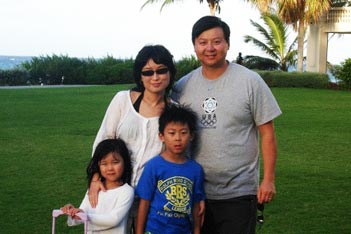Looking for Mutations in Cancer Cells to Screen for Aggressive Prostate Cancers

Rob Nam with wife Yuna and children Amy and Matthew in Jamaica
Robert Nam is an active surgical oncologist who treats
cancers of the kidney, bladder, prostate and testes in a
busy clinical practice. He is also a committed surgical
researcher ("75% clinical and 75% research" - his definition
of a surgeon scientist). At Sunnybrook's Odette
Cancer Centre, he partners with Arun Seth, a highly
productive molecular biologist, studying prostate cancer
genes. Together they have discovered a gene fusion that
occurs specifically in aggressive prostate cancers and is
expressed in circulating tumour cells. Rob was awarded
the 2008 RCPSC Medal in Surgery for this research; he delivered
a Royal College guest lecture at the University of Western Ontario entitled,
"Clinical Application of Prostate Cancer Genetics".
The circulation of shed tumour cells is a phenomenon
that has been recognized for over 50 years. Curiously, there
has been little progress on understanding this common
phenomenon, or using it for diagnosis or prognosis. The
Prostate Specific Antigen (PSA) test has been a disappointment
as a screening test. It is insufficiently accurate, particularly
at identifying the lethal forms of prostate cancer. In
addition to over-diagnosing indolent cancers that have no
clinical significance, the test is falsely negative in 25% - one
in four patients with a normal PSA has prostate cancer. A
better test is needed, since one third are aggressive cancers.
|
To identify new biomarkers for prostate cancer, Rob
is exploring the effectiveness and tolerability of screening
by biopsy. In a pilot study, 300 volunteers responded to
an ad in The Toronto Star; fifty have been biopsied. The
majority found this minimally invasive test well-tolerated,
and would recommend it to a friend. The biopsy
takes five minutes to perform and has a low complication
rate. The tissue can be subjected to vigorous and
detailed genetic analysis.
Rob is also looking at genetic polymorphisms in prostate
cancers in their 4000 specimen tissue bank using
gene chips. He continues to find novel genes for prostate
cancer and aggressive prostate cancer in addition to the
fusion genes that he and Arun have described. Arun
has been studying the significance of genetic markers
in breast cancer and Rob has extended these studies to
prostate cancer.
Rob is a Toronto-born and trained surgeon from start
to finish. His sister Diane Nam, an orthopaedic surgeon
scientist, is described in a nearby article. His wife Yuna
Lee is a general internist and physician educator at St.
Michael's Hospital. They were married when Rob was
in the Surgeon Scientist program developing his data
base, tumour banks, and genetic studies. Yuna and Rob
have two children; Matthew is 7 and Amy is 4. Rob is
meticulously devoted to being home with his children
by 6pm, and carries out his research between 9pm and
midnight. They ski, golf and travel as their recreational
activities. Grandparents on both sides have facilitated the
careers of both parents.
Rob is grateful to Michael Jewett and Steven Narod,
the Chair of the Breast Cancer program at Women's
College Hospital, for launching his research career, and
to Surgeon-in-Chief Robin Richards for his continuing
support. Though there are many fellows and postdocs
involved in the project, Rob has no urologic surgeon
scientist in his program. The urology specialty committee
of the Royal College discontinued allowing one year
of residency credit for laboratory work, unlike many
other surgery committees. Rob has participated in the
leadership course of the Department of Surgery and
was recently nominated by Robin Richards for the new
Schulich one-year executive leadership course to be given
to faculty members at Sunnybrook.
M.M.
|